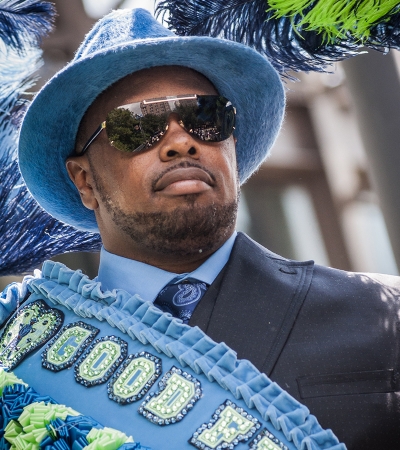My alarm clock goes off at 2:30 in the morning. I run airport transportation, and I also run limo. I’m grateful for the clients I have along the way. I’ve worked for certain celebrities like Beyonce and Bruno Mars. One of my most cherished moments was sitting down and eating dinner with Martin Luther King Jr.’s son. I was honored because of who his father was. A bunch of times, I’ve left home at three in the morning and people will still be out partying. I think a man of a certain age, if he has to be in the night clubs and the streets all the time, might be compensating for something. I can do without it. Now that I’m getting older, I really rather put my energy into my work, and my club.
I couldn’t have been no more than five when I was introduced to second lining. I’m 51 years old now. I was raised by my mother, Ora, on St. Phillip Street in Tremé. My mom was a straight country girl. She was from Vredenburgh, Alabama. She left home at a pretty young age and moved to Mobile, and then here. She would go back and visit every blue moon, but this was home. New Orleans—its culture, freedom, joy all at once—just gave her everything that she was looking for. She was a survivor and loved by everybody. She loved the parades. They used to call her Jumping Jack because she would dance and jump at the same time. The bands back then were the Olympia Brass Band, the Pin Stripe. The Dirty Dozen was about the hottest that I could recall. Being around it all the time, I found my love for the music—the horns. When that band strike up, I’m going to follow that.
There were barrooms all over the Tremé. Roland’s Bar, right across from our house, sat on the corner of North Villere and St. Philip. And then there was the Caledonia, which sit on the corner of North Robertson and St. Philip. My mom worked at Roland’s and Caledonia’s, too. She also worked at Roosevelt’s, which sat on the corner of Claiborne and St. Philip, but it burned down over the last couple of years.
I was a bit young, so I wasn’t barroom material, but whenever there was a parade, the clubs would make their stops and go into the bar. As a kid, that was our biggest excitement, being able to go into the bar— couldn’t do nothing but just look at the older people, but, yeah, we were in the bar! Clubs patronizing the bar builds their clientele. Most bars provide little sandwiches or something in appreciation for stopping. People come in and give them business.
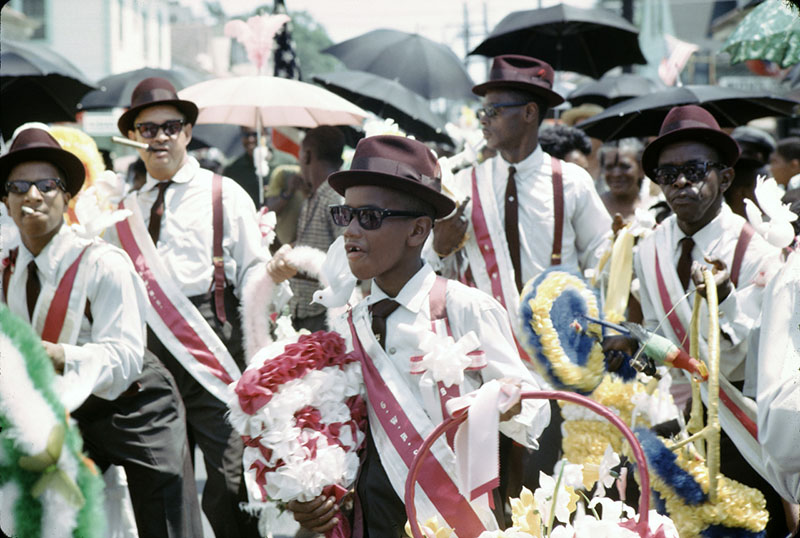
Across the street, Ms. Annie Mae named her sweet shop after her daughter, Doreen Ketchens. We used to go in there and play the pinball. Doreen grew up to be a great clarinet player—she plays on Royal Street in the French Quarter. We used to play outside, too. I remember when the Armstrong Park was being built a few blocks away. We went in there to play hide-and-go-seek in the dirt, shoot marbles. During Carnival, my mom used to have me out there with the Indians. Those Indians was rapping and raving and it just scared the heck out of me. I’m like, “Nah, I ain’t like that.”
But the bands, I was always fascinated by that. And she bought me instruments. Drums, organs, guitars—never learned to play any of them like some of my friends from Craig Elementary did. I went to school with the founders of the Treme Sidewalk Steppers, Sean Martin and Derrick “Charlie Brown” Walker, and members of the New Birth Brass Band—Caytanio Hingle and Kerry “Fat Man” Hunter. Tanio and them learned to play music with Tamborine and Fan. It was more spiritual music back then. Most people don’t realize that second lining is actually a spiritual connection with that. I never took the time out to learn how to play instruments like they did. Had I stayed in that area, who knows what would have happened. But when I moved, it definitely wasn’t going to happen.
The last time I could remember being a child was on St. Philip Street. My mom and I had it kind of rough after that. She always would do her best, but she was a single parent, and she liked to drink. She didn’t make it easy for me; she let me experience life. She struggled to keep a roof over our head. When we left the Tremé, we first stayed in the Seventh Ward on North Derbigny and Columbus, and then right off of Frenchmen. But when I was about 11 or 12, we moved uptown to the Magnolia Projects. It’s like moving from the country to the city again. Once you cross over Martin Luther King Boulevard, you’re in a different world. I went from elementary to adulthood.
Education
My mom rented an apartment in the Magnolia at 2814 Washington Avenue. I was fascinated with the streets; by the bad boys’ rules and their way of doing things. I watched movies like The UntouchablesI hung out with older guys. Back then, the rule they applied was loyalty, and if you wasn’t loyal, you got cut off. This fascination is why I named my club Good Fellas. I learned from the older guys. I watched them. I think that’s one of the reasons I’m still alive because I moved a bit different than most people. So many buddies that are not with me today. I see so many people who went to school with me, or grew up with me, and they look so much older than me. Just lived a rough life.
Throughout my youth, I was a criminal, but I was smart. I had good grades in school, but in every form of the word, I was a bad child. I was supposed to graduate in 1987, but I went away to a juvenile detention center, Scotland, for a few years. After I came home, my mom brought me to Booker T. Washington, and they put me in my right grade along with my age range. I was in school while I was incarcerated, but they didn’t give you any credits. I got put out of Booker T. real quickly. That first week I had a fight, then right after that I did something else, and something else, until I got expelled.
I ended up going to Grap’s on Leonidas in Pigeon Town—what would be known as the bad person school. When they realized I didn’t have any high school credits, and I was almost 18, they wouldn’t take me. They told me that I had to get my GED. I really didn’t want that. I sat out, hung out in the hood, and did everything that I had been doing selling drugs. But I was bored. All the kids were in school. I found myself going around the schools at lunchtime. My good friend, Joseph, enrolled in Cohen, and told me, “Man, you got put out of school last year. You ought to try to go back to school, you know, this year.”
I wasn’t sure.
He said, “Well, just come with me. It was his first day at Cohen. I went around there, saw those little girls, and I hurry up, run home and tell my mom I want to go to Cohen. She brought me round there, but Cohen sent me back to Booker T. Booker T sent me back to Grap’s, because they had already expelled me. The lady at Grap’s didn’t quite remember me and let me in. I was an angel. I was quiet the whole day. You would almost think I was a nerd. I did my best to do my work. By the time she remembered who I was, she began by saying, “I told you last year what you need….but you doing so well.” She let me stay.
The Third Ward and the Seventeenth Ward used to always fight, so I wound up having a fight, and they transferred me out to Clark in the Sixth Ward. I knew I couldn’t go to Booker T. because I was too close to home—I’m going to get myself in trouble. When I came down to Clark, the principal was like, “You older than most of my seniors. The first thing you do, you’re gone.” She was looking at my jail background, all my trouble, too. The first few weeks, I had a fight, but it wasn’t my fault. She found out, but she kept me, and I did pretty good. I actually graduated in 1990. My mom was able to see me walk across the stage.
Soulja Slim
I’ve never been too much of a follower. I’ve always been the one who’s ready to put the plan together; the orchestrater of whatever was going on. We drew large crowds in the Magnolia. We had a lot of people who would come back there by us—that was just the place to be. They didn’t live in there, but you couldn’t tell them that. If you were cool, you were welcome. I don’t recall it mattering if you were from the Ninth Ward, Mississippi, China, or Russia.
Sometimes somebody would give a little block party with a DJ, but I wasn’t a fan of sitting around. Living a certain lifestyle, I had to be very aware of my surroundings. I still don’t like my back turned. When I come to second line, most people who know me will find me standing on the porch so I can look out to see what’s happening first. I’m always on the observant, so I never just up and jump in the middle of the crowd. And then I’m on the move—I’m not going to stay stagnant.
James “Soulja Slim” Tapp Jr. come up under us as a little boy. I could just go on and on about the relationship we had, the respect that he had for me, the discipline I would give to him. He hung with his buddy Ricardo “Ducky” Hollins like wet clothes. I used to have an old school Ram Charger and they couldn’t wait until they’d see me coming through the driveway or court. “C’mon, c’mon!” We’ll be shooting dice.
His music was really beginning to take off. The last time I saw him, Ducky and I were shooting dice. He passed by and jumped out of the car. I won’t use the words that we used with each other, but I’m like, “Come on, get in this game.”
“No, I’m ‘bout to go.” He had that little goofy smile: “I ain’t messing with y’all!” He hollered at all of us, jumped back in the car, and left.
Soulja Slim was shot and killed on November 26, 2003. Most of us from out the projects went to his mother, Linda Porter’s, house. I saw myself on the news later just holding my head. At his funeral, I stayed outside. I didn’t want to see him like that, but from what I understand, you couldn’t even get in it was so crowded.
Ducky went on to write a book called Murda Capital that he published with his company R.H. Publishing. Every time he saw me, he kept fussing, “When you gonna get my book?” Unfortunately, I never got it. On November 30, 2016, he was shot right on Galvez and Canal. After his passing, I went to Community Book Center on Bayou Road to find it, but they had sold out.
Soulja Slim’s mother and I go to church together. Linda’s been through a lot. Her club, the Lady Buckjumpers, puts on a very anticipated parade. It’s Bayou Classic weekend, and there are people who come all the way from out of town to go to that one parade. It’s a crowded day, and she keeps her club in order—you can see clean down the street. Those girls stay in line in the same way that Black Men of Labor and Sudan stay in line. They’re going to do their little routines, get back in line, and march. Last year, I was their parade chairman, and I asked her, “How you do it?” She just laughed.
Parading Uptown
A lot of parades came through the Third Ward—the Young Men Olympia, the Lady Buckjumpers, Prince of Wales, and the Calliope High Steppers—but for years I took a break from them because of the lifestyle I was living. At a point in time, I didn’t feel comfortable going out there because I didn’t know who I was going to run into. Now it feels good now to be able to go where I want to go and be free as a bird.
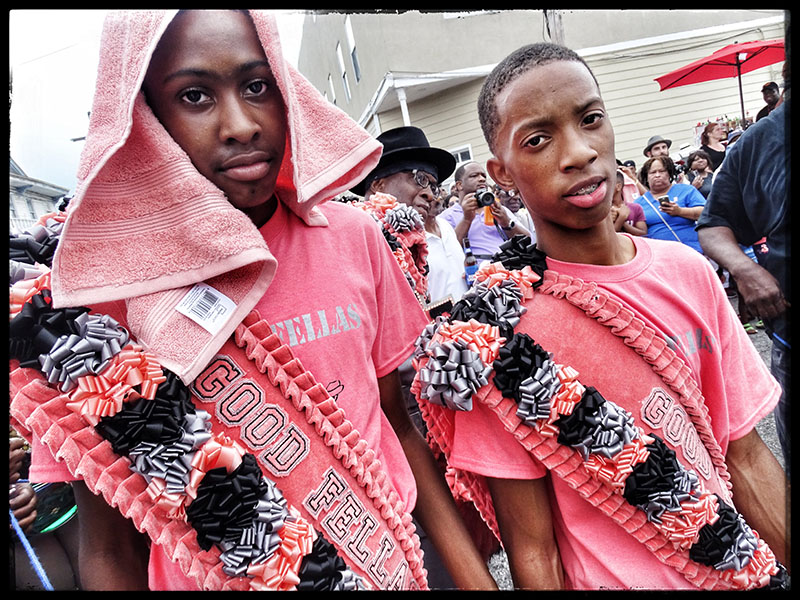
The first club I ever paraded with was Kevin Dunn with the Original Four. He works in the maintenance department at Dillard University. What he puts together is pretty much the best of everything. He’s not going to allow anything to go out there undone. He takes pride in everything he does, and he taught me everything. That’s my brother, period. Before being with Dunn, I didn’t wear suits and ties. I’ve always been a dresser, but just on a different level. We’re both obsessed with shopping. We’ll go all the way out of town to just go buy a suit and some shoes. It feels good when you putting on a suit and you dressed up. Just a totally different look. Now I can probably put on a different suit for every day of the month, with a different pair of shoes with it.
After Katrina, I formulated Good Fellas in 2007, to be honest, to see if I could do it. I wanted to see how hard it was to put a group together. I paraded three times that year: in January with the Perfect Gentlemen, the Original Four, and brought out the Good Fellas. My parade takes place Uptown because that’s where I spent the majority of my life. Right now, I have two members from the Magnolia. The rest are from all over the city. Nobody owns any part of New Orleans. I don’t discriminate. I’m more interested in your character more than anything. I don’t care how much money you have, if you can dance. I want to know if you’re upstanding because I have my kids out there, I have the supporters out there. I don’t take to everybody. My circle is very small when it comes down to that, and that’s basically due to how I used to live, unfortunately, and maybe fortunately, because I’m here today.
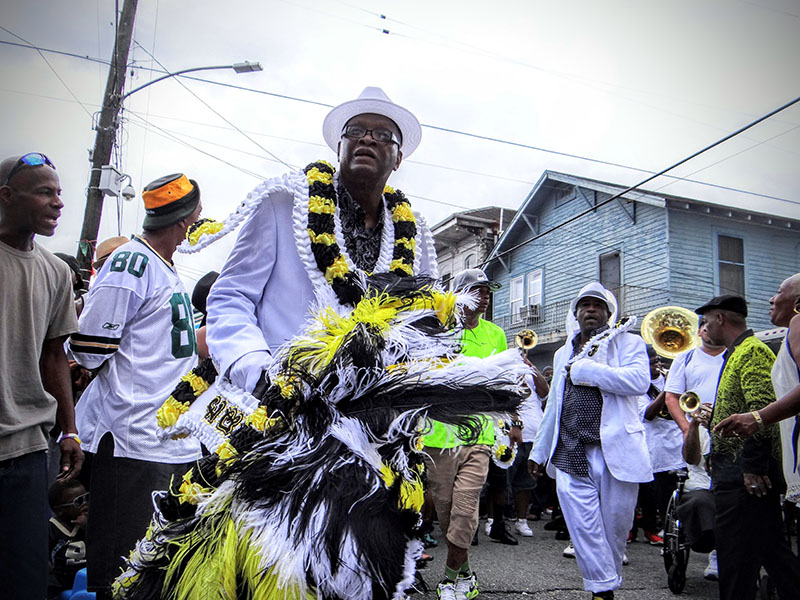
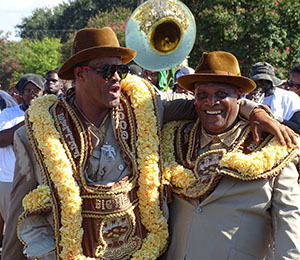
I keep my organization small because if you have a whole bunch of guys, it’s a whole lot of personalities. The most I’ve ever had at one time was maybe ten. I usually have around ten kids with me as well—at one point, the majority of them were all my kids, four of my daughters and my son. They come in handy because by second half I’m tired and blown out, so those kids got a lot of energy.
We’re always the third Sunday in September. If you ever really paid attention to our parades, I’m exclusive. A Good Fellas Sunday doesn’t have the notoriety of a Lady Buckjumpers parade or a Sidewalk Stepper parade, or even a YMO or a Zulu parade, but it’s still a classic day. I don’t do all the floats, but to parade with Good Fellas is very, very expensive. It’s mostly because the suits are quality clothing that you can wear again. The materials, like rhinestones, used for the decorations are time consuming. I’m looking at eight to ten hours per man.
I’m always trying to please my members. At some point, I step in and take authority, but I do my best to give everybody an opinion. If it’s logical, then I try to go with what my members want. Far as the colors, I pick the clothes, but I always ask, “What you think of this?” If they like a certain color, I’ll try to make that work. I’m not going to wear anything ridiculous, at all; never. If you just look at my club and look at pictures of the Original Four, it’s basically the same look. Kevin Dunn is my heart, the mastermind. We’re not going to argue unless it’s parade time. I’m picky and he’s picky, but every year he’s going to make sure we’re beautiful.
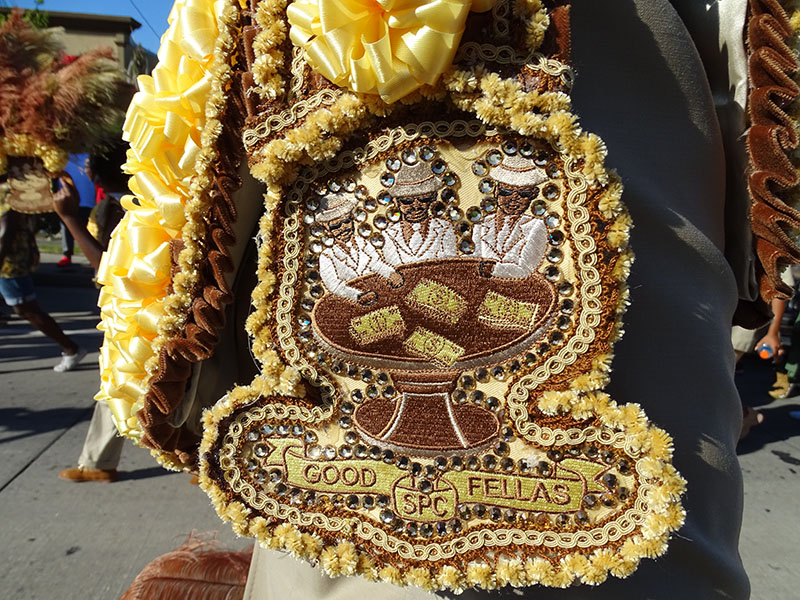
2814 Washington Avenue, Apartment A
Out of all the years, I keep my route pretty much the same. In September, it’s warm so I be trying to stay on the bigger streets under the canopies of live oak trees. When we started, we began at the Cricket Club on St. Charles Avenue, and then it turned to Eiffel Society. We normally take that route up St. Charles to Jackson, from Jackson to Second and Dryades. Since my mama passed in 2012, I’ve started the tradition to stop where I grew up at on Washington Avenue in the Magnolia. That’s going to be a stop forever for me as a memorial. From there, we usually go over to the Jazz Daiquiris, then we head on out. We used to stop at Fox Bar. Over the past several years, we’ve disbanded at Jay’s Barber Shop on Earhart.
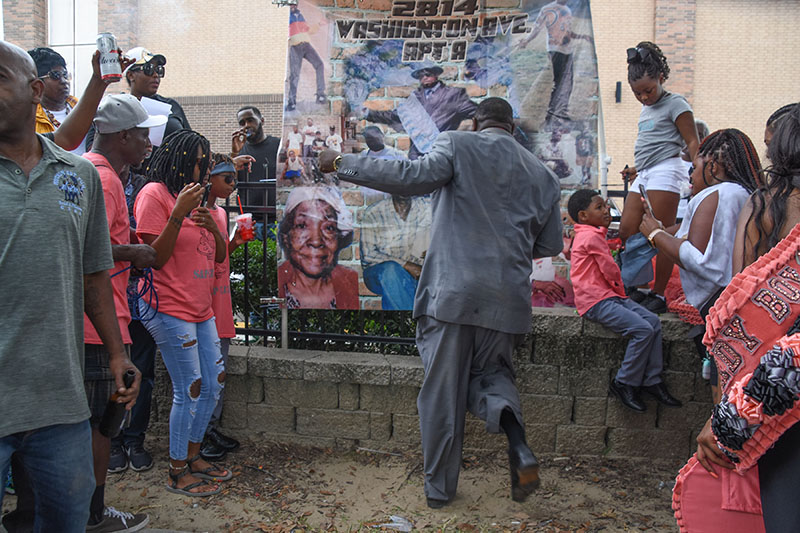
Clubs like to hire brass bands that respect the people they are performing for; they understand they are playing for the organization that hired them. The crowd is always going to have opinions, but the crowd’s not paying. From the beginning, we had Hot 8 because of my friendship with the leader, Bennie Pete. To be a big guy, he’s like a gentle giant. A real good guy. We met up at Loyola University where he was working at the time. He liked my Ram Charger. I had it fixed up really nice, and he said, “I’m gonna get me one of them trucks.” And he wound up getting one. We connected from there. I used to follow Bennie and them everywhere.
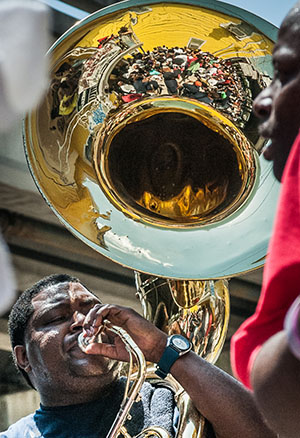
When their snare drummer, Dinneral Shavers, passed in 2006, I went over to where he was shot. He was laying there, and I’m just looking at him, and I’m like…wow. Bennie has had his share of tragedy with the way Joseph “Shotgun Joe” Williams left. He was killed by the police right by the Caledonia where I grew up in Tremé.
For the longest, we had the Hot 8 and the Stooges for my kids’ division. But Bennie always wanted to travel, so once the opportunity became available for him, he took it. He told me, “Man, we might not be there for the parade.” Of course, I’m disappointed, but I understood. The first band we got outside of the Hot 8 was TBC—they definitely know the music—and now we hire the New Breed for the kids. Between TBC and New Breed, it’s pretty much like family, cause Desmond Provost from New Breed is my son-in-law, and Bernard “Bunny” Adams is my brother-in-law.
I realize a lot of the younger bands playing now are coming straight out of high school playing, and I think that’s why it sounds more like a marching band coming up the street. I could recall telling some of the bands that they were walking too fast—I mean, you’re running at that point. You know, second lining is always a nice steady pace that the bands kept. It feels good to dance to some of the older songs. If you give me a parade four hours’ worth of that, I’ll dance ‘til my ankles hurt. I understand that change is bound to happen as time progresses, but if the younger bands were to go back and take look at what the music was about, they would comprehend what the whole parade is about—it’s a spiritual thing. If it gets taken out of context, it becomes more secular than anything.
You go through a lot of headaches as a leader in this. Your members give you headaches, the hard work gives you headaches. Any club president shares the same worries—whether this right or that’s right, the money, the bands, the performers, what goes on at the parade, it’s all a big concern. It’s actually pretty draining. It’s fun the first year. After that, it’s been downhill ever since. I keep it going cause it’s my baby, but it’s hard. My enjoyment and my excitement come from just looking at what I put together, but it’s very exhausting.
For our ten-year anniversary, Dunn didn’t want to parade. He’s like, “Man, I’m done. I’m done.”
I told him, “You kinda the reason why I’m parading, so you gonna be here with me.”
And he agreed. My theme was “Only God Can Judge Me.” Dunn made bibles on the streamers that opened up to scripture from Romans. He enjoyed his self to the fullest.
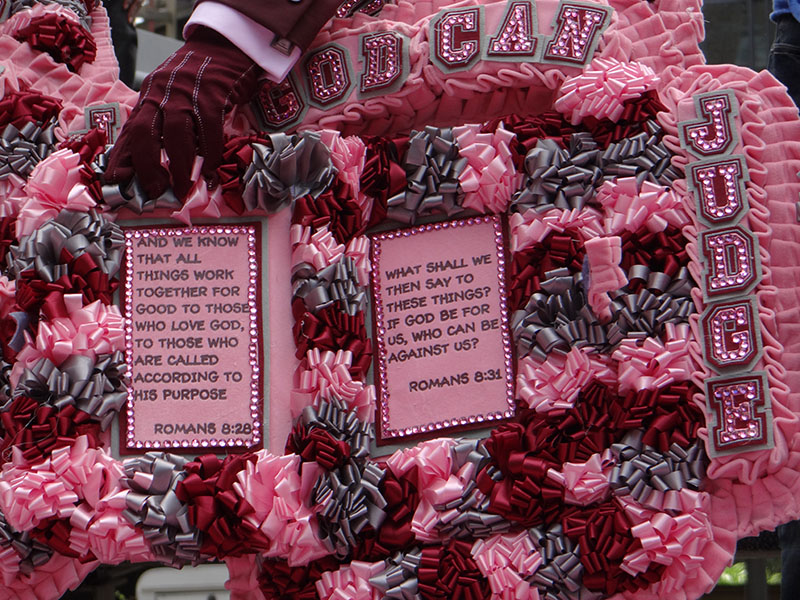
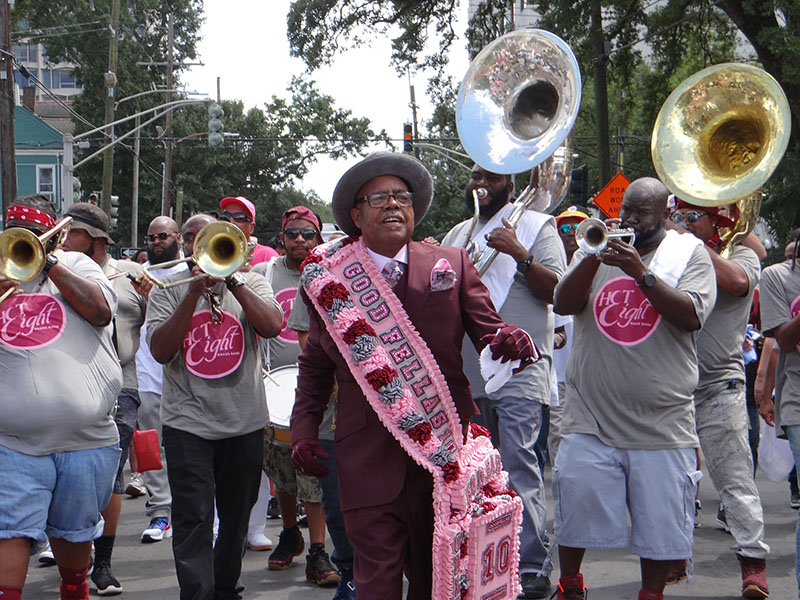
Our parade day in 2020, of course with COVID everything, was canceled. I was just at peace. I was at home chillin. I didn’t have to worry about the decorations, didn’t have to watch the weather. We have our shoes already. I didn’t go any further than that. It rained on the third Sunday in September. I was amazed because, over the years, God has spared us, and it really rained on the day we didn’t parade.
Interview conducted by Rachel Breunlin of the Neighborhood Story Project.

